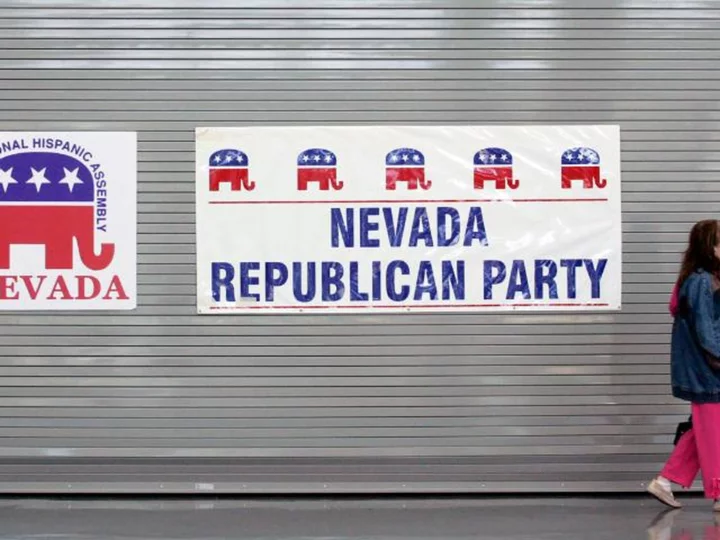
Nevada Republicans will hold 2024 presidential caucuses on February 8
The Nevada Republican Party will hold its 2024 presidential caucuses on February 8, the party announced Monday.
2023-08-15 02:47
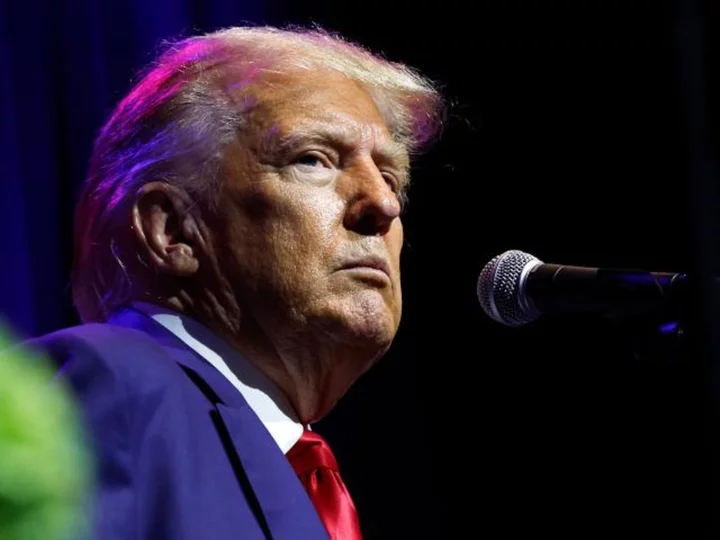
Exclusive: Former Republican legal officials endorse special counsel's speedy trial date proposal in Trump Jan. 6 case
Nearly a dozen Republican-appointed former judges and high-ranking federal senior legal officials on Monday endorsed the January 2, 2024, trial date proposed by special counsel Jack Smith in his 2020 election interference criminal case against Donald Trump.
2023-08-15 01:47
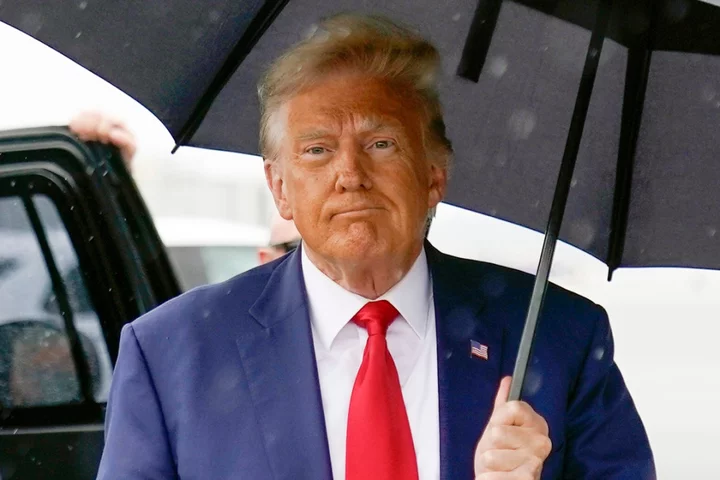
Can Donald Trump pardon himself?
Donald Trump has already been indicted three times this year, twice at the federal level. In April, he was arraigned in New York and pleaded not guilty to state charges after receiving an indictment from Manhattan district attorney Alvin Bragg accusing him of manipulating his business records to conceal hush money payments allegedly made to porn actress Stormy Daniels in 2016 to stop her discussing an extramarital affair they are said to have had in 2006 in time to derail his presidential run. Justice Department special counsel Jack Smith then handed him a federal indictment in May over his alleged mishandling of classified government documents following the conclusion of his one-term presidency and then another in August over his efforts to overturn the 2020 election result, accusing him of conspiracy to defraud the United States, tampering with a witness and conspiracy against the rights of citizens. In both cases, Mr Trump again pleaded not guilty to all charges. But that’s not all. He could be about to face a fourth indictment, this time from Fani Willis, district attorney of Fulton County, Georgia, over his attempts to influence the 2020 vote count in that crucial swing state, which turned blue for Joe Biden and prompted Mr Trump to pressure local secretary of state Brad Raffensperger into helping him “find” the 11,780 ballots he needed to win, a conversation that was recorded and described as “worse than Watergate” by veteran Washington Post journalist Carl Bernstein. While Ms Willis hasn’t confirmed that an indictment will be handed down this week, her earlier statements and security measures surrounding the Fulton County courthouse indicate that movement is imminent in the case. No former or sitting president of the United States has ever been formally charged with a crime before, so for Mr Trump to have received multiple indictments is already history-making, another ignominious claim to fame for the first American commander-in-chief ever to have been impeached twice. The prospect of Mr Trump winning the presidency again in November 2024 and then attempting to use his presidential pardoning powers to excuse himself is a fascinating prospect that could yet become a reality. As president between 2017 and 2021, Mr Trump cheerily used his executive clemency powers to hand out pardons to no fewer than 237 people, from Arizona sheriff Joe Arpaio to right-wing content creator Dinesh D’Souza by way of cronies like Steve Bannon, Roger Stone, Michael Flynn, Paul Manafort and George Papadopoulos. Whether he had the authority to pardon himself was a key question at the time he left office in the aftermath of the deadly Capitol riot of 6 January 2021, which, ultimately, never had to be answered because he did not attempt to do so. The broad consensus among legal experts back then was that there was no stipulation in place to actually prohibit such an act but, given that there was no precedent for it either, it would likely be subjected to a lawsuit calling into question its legal validity. While Mr Trump is now a private citizen and therefore has no such powers, he does find himself in the extraordinary position of being thrice-indicted while simultaneously leading the pack for the Republican Party’s nomination to be its candidate for president in 2024, leaving such rivals as Ron DeSantis, Mike Pence, Nikki Haley, Tim Scott and Chris Christie eating his dust in the polls. There is nothing in the US Constitution to stop someone from running a presidential campaign while under indictment or even having been convicted of a crime, although its 14th Amendment does prevent anyone from running who has taken an oath of office and thereafter engaged in “insurrection or rebellion” against the country, which could ultimately cause problems for Mr Trump should he be convicted over Mr Smith’s charges pertaining to the Capitol riot. Unless that comes to pass, however, he is free to run for the White House once more. But what would happen if he were to actually win and attempt to use his reinstated pardoning powers for his own benefit is where matters get really knotty. Firstly, presidential pardons are only applicable to federal crimes. While that means he could potentially absolve himself in the classified documents and 2020 election cases brought by Mr Smith, he could not do the same in the indictment brought by Mr Bragg, which is a state affair. Second, the Constitution bans presidents from pardoning themselves from impeachments, meaning any conduct Mr Trump is found guilty of committing in connection with impeachment would not be eligible for a pardon. Third, any pardon would almost certainly result in a Supreme Court case and the court might not be inclined to side with Mr Trump, despite the current conservative majority on its benches. A Justice Department memo from 1974 stated: “Under the fundamental rule that no one may be a judge in his own case, the president cannot pardon himself.” While that memo is not law, it could be used to argue for precedent should the situation go to court. Therefore, if a scenario were to arise in which Mr Trump won the 2024 election but was convicted on charges in the state case (a trial is scheduled for March) or in the federal case relating to the Capitol riot, over which he was impeached, he would not be allowed to pardon himself, likely resulting in a massive and costly legal fight to spare him jail time. If he found himself unable to avoid that outcome, the situation would almost certainly lead to a third impeachment or his removal from office via the 25th Amendment, which allows the Cabinet to remove a president who is unable to perform their duties. There are many duties and trappings of the presidency an incarcerated person would simply not be able to carry out from a prison cell, like the viewing of classified materials, to name just one. We are still very much in hypothetical territory at this point, with any potential conviction for Mr Trump still a long way off and little more than a distant possibility. But the conversations he has started with his latest bid for the presidency have already pushed parts of theoretical US constitutional law far further than many experts ever believed they might live to see. Read More Trump judge demands court hearing as Jack Smith and ex-president spar over protective order – latest Trump-appointed Judge Aileen Cannon sides with Trump again in classified documents case Former Republican official in Georgia subpoenaed over Trump efforts to change election result Trump and Biden tied in hypothetical 2024 rematch, poll finds Prosecutors have started presenting Georgia election investigation to grand jury Hunter Biden's lawyers say gun portion of plea deal remains valid after special counsel announcement Trump assails judge in 2020 election case after she warned him not to make inflammatory remarks
2023-08-15 00:58
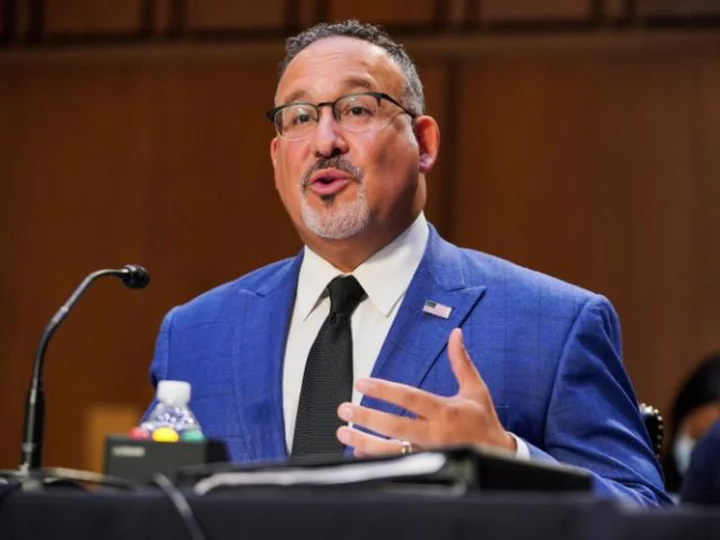
Biden administration releases 'legal resources' for colleges in response to Supreme Court's affirmative action decision
The Biden administration is releasing new guidance and "legal resources" for colleges and universities that want to ensure student diversity in the admissions process after the Supreme Court gutted affirmative action in June.
2023-08-15 00:54

Three US military services without Senate-confirmed chiefs for first time in history
Another US military service chief has relinquished command without a Senate-confirmed replacement in place, marking the first time in the Defense Department's history that three services are operating without a confirmed senior military officer in place.
2023-08-15 00:25
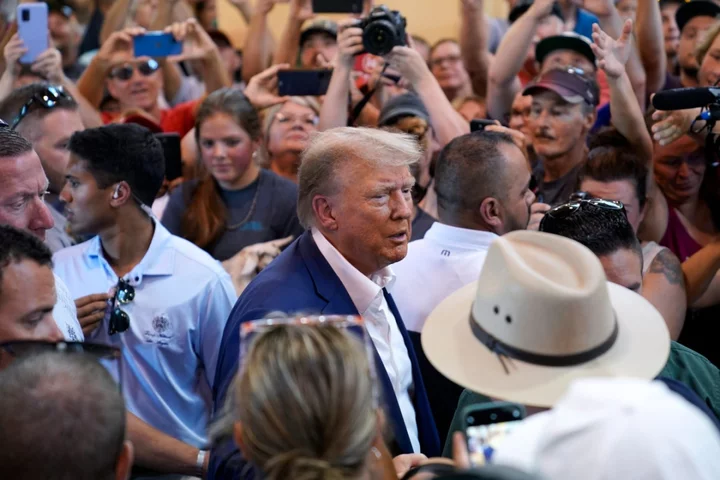
Trump wildly inflates size of crowd at Iowa State Fair
Former president Donald Trump inflated attendance numbers of his appearance at the Iowa State Fair, saying he had a record attendance for his campaign stop. Mr Trump gave a press conference at the fairgrounds in Des Moines that was broadcast by Real America’s Voice. “It’s a real honour to be here,” he said. “We have a record that was set. The record is the largest crowd they’ve ever had and I can see that because you can’t get any more people here. I’m very honoured by it, tremendous thing.” Mr Trump attended the state far as he seeks to win the Iowa Caucus, where he came in second place in 2016. Florida Gov Ron DeSantis, former South Carolina Gov Nikki Haley, former vice president Mike Pence and businessman Vivek Ramaswamy, among others, also attended the state fair as they attempt to court voters. But all of the candidates significantly trail the former president, who won Iowa in the general election both in 2016 and in 2020 as it has moved from being a battleground to a solidly conservative state. The Des Moines Register reported that the third day of the state fair, on which Mr Trump attended, had 5,000 more people attend than the third day of the 2022 state fair and 118,000 people attended altogether on the third day of the fair. The all-time attendance record for the state record came in 2019 when 1,170,375 attended throughout the entire fair. Mr Trump has regularly inflated attendance numbers for his events. Most notably the day after his inauguration, then-White House press secretary Sean Spicer told reporters incorrectly that Mr Trump’s inauguration had “the largest audience to ever witness an inauguration, period, both in person and around the globe.” The former president made the appearance as he faces three indictments, two on the federal level and another from New York, as well as a potential indictment from the office of the district attorney for Fulton County, Georgia. Read More Trump heaps praise on anti-Muslim conspiracy theorist as fourth potential indictment looms in Georgia – latest Republicans slam Biden’s blasé response to questions about Maui wildfires
2023-08-14 22:58
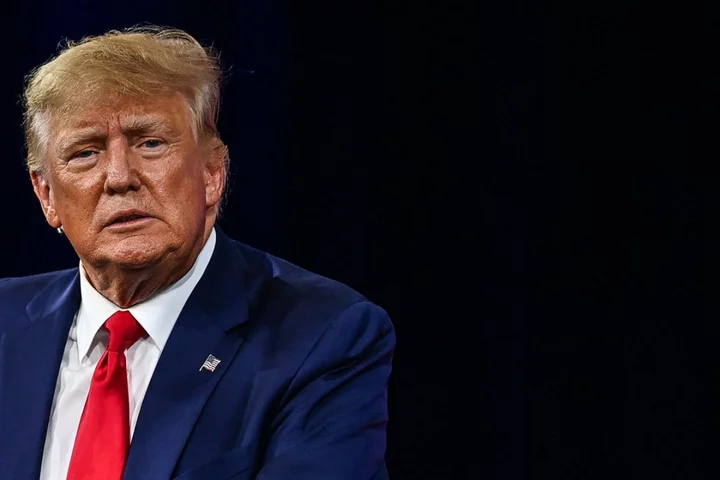
Eight key revelations from Trump’s January 6 indictment
A four-count federal indictment against Donald Trump accuses the former president of conspiring with his allies to overturn the results of the 2020 presidential election and deprive Americans of their right to have their votes counted. The detailed, 45-page federal indictment on 1 August outlines three criminal conspiracies and Mr Trump’s alleged obstruction of the certification of Joe Biden’s victory, a multi-state scheme built on a legacy of lies and conspiracy theories to undermine the democratic process. Mr Trump appeared in court in Washington, DC, on 3 August to plead not guilty to the charges and once more complained that he was the victim of political persecution by his enemies. “When you look at what’s happening this is a persecution of a political opponent,” he told reporters afterwards. “This was never supposed to happen in America. This is the persecution of the person that’s leading by very, very substantial numbers in the Republican primary and leading Biden by a lot so if you can’t beat them you persecute them or prosecute ‘em,” Here are eight key points from the historic indictment of the former commander-in-chief. A five-part scheme to overturn election results The indictment outlines five major elements of an alleged scheme that forms the basis of the charges against Mr Trump, including a conspiracy to overturn the results of the 2020 election. The indictment states that Mr Trump and co-conspirators relied on knowingly false claims about election fraud to pressure state lawmakers and officials to subvert election outcomes by ignoring the popular vote, then dismissing legitimate electors and assigning illegitimate ones loyal to Mr Trump. They then organised those fraudulent slates of electors in states that the Republican lost, according to prosecutors. Mr Trump and his allies then allegedly used the authority of the Justice Department to conduct sham investigations and press state lawmakers into action to approve those false slates of electors. Then-President Trump and his allies then attempted to enlist then-Vice President Mike Pence to reject legitimate results, including an attempt on 6 January 2021 to fraudulently alter the results while overseeing the certification of the election, according to the indictment. And after it was clear that Mr Pence would not do so, Mr Trump “exploited” the chaos from a mob of his supporters, fuelled by his election lies, to continue to delay the certification based on those same false claims, the indictment states. Trump knew his election lies were lies Mr Trump’s “prolific lies” about election fraud span “dozens of specific claims” that he knew were false, according to prosecutors, despite “candid advice” from his own aides, administration officials and the Justice Department and determinations from the courts and election administrators across the country, which the former president then “deliberately disregarded”. His “knowingly false statements” were “integral to his criminal plans to defeat the federal government function, obstruct the certification, and interfere with others’ right to vote and have their votes counted,” according to prosecutors. Many of the examples included in the indictment were previously known, though prosecutors isolated claims and schemes involving five key battleground states that Mr Trump lost. “Despite having lost, [Mr Trump] was determined to remain in power,” according to the indictment. “These claims were false, and the Defendant knew that they were false. In fact, the Defendant was notified repeatedly that his claims were untrue – often by the people on whom he relied for candid advice on important matters, and who were best positioned to know the facts – and he deliberately disregarded the truth.” There are six co-conspirators Six unnamed co-conspirators who allegedly ushered through Mr Trump’s actions are listed throughout the indictment. Based on their alleged actions that match previous descriptions and events surrounding the case in the aftermath of the 2020 election, those co-conspirators are likely to include Trump-connected attorneys Rudy Giuliani, John Eastman and Sidney Powell – all of whom face professional sanctions in the wake of their efforts. The other co-conspirators are likely to include former Justice Department official Jeffrey Clark – who “attempted to use the Justice Department to open sham election crime investigations and influence state legislatures with knowingly false claims of election fraud” – and Kenneth Cheseboro, another attorney who promoted the fraudulent electors scheme. A sixth unnamed co-conspirator is described as a “political consultant who helped implement a plan to submit fraudulent slates of presidential electors to obstruct the certification proceeding”. A pressure campaign and fraudulent electors The attempts among Mr Trump and his allies to pursue a so-called “alternate” fraudulent elector scheme are well reported and central to the House select committee investigation surrounding January 6. The indictment outlines Mr Trump’s use of “deceit” with the aid of his six co-conspirators to pressure officials in Arizona, Georgia, Michigan, Pennsylvania and Wisconsin to subvert legitimate election results and change electoral votes. Mr Trump then relied on “dishonesty, fraud and deceit” to organise those fraudulent electors to submit false vote certificates to Congress, according to prosecutors. Mr Trump and his network of co-conspirators and Republican Party officials directed officials to perform “sham” proceedings that would ultimately position Mr Pence to oversee the fraudulent certification of a bogus slate of electors that would allow Mr Trump to cling to power, the indictment states. The former president also allegedly leveraged the Justice Department and the White House to advance those electors, while Mr Trump ignored legal counsel from the US attorney general to convince Mr Pence to overturn the election. Trump’s attempts to convince Pence to overturn the election When Mr Pence called Mr Trump on Christmas Day in 2020, the president quickly turned the conversation to the upcoming joint session of Congress on 6 January 2021, when Mr Pence was set to preside over the ceremonial certification of the electoral college votes, according to the indictment. “You know I don’t think I have the authority to change the outcome,” Mr Pence said, according to prosecutors. On 1 January, Mr Pence resisted Mr Trump’s efforts again, to which Mr Trump allegedly replied: “You’re too honest.” Days later, Mr Trump and a co-conspirator believed to be Mr Eastman pressed Mr Pence to unilaterally reject the legitimate results or send them back to state legislatures, a strategy that Mr Pence questioned was even defensible, prosecutors wrote. “Well, nobody’s tested it before,” Mr Eastman allegedly replied. The indictment states that Mr Pence took “contemporaneous notes” from that meeting. Mr Trump continued to press Mr Pence, in both one-on-one White House meetings and in public statements in remarks leading up to the attack on the Capitol. That morning, an “agent” for Mr Trump contacted an unnamed US senator asking him to “hand deliver” fraudulent elector certificates from Michigan and Wisconsin, according to the indictment. Mr Pence rejected them. Mr Trump later called Mr Pence demanding once against that he either reject or return legitimate results for Mr Biden. Trump officials considered the Insurrection Act Three days before January 6, a co-conspirator believed to be Mr Clark spoke with a deputy White House counsel who had previously warned Mr Trump that “there is no world, there is no option in which you do not leave the White House” on 20 January 2021. That same White House counsel allegedly tried to dissuade Mr Clark from assuming the role of acting US attorney general, stressing that there was no evidence of widespread fraud and that if Mr Trump successfully overrides the election there would be “riots in every major city in the United States”, according to the indictment. “Well,” Mr Clark allegedly replied, “that’s why there’s an Insurrection Act.” Mr Trump had previously threatened to use the Insurrection Act to quash Election Day protests and civil rights groups and legal analysts had feared his months-long campaign to undermine election results could serve as a pretext to deploy militarised federal and civil law enforcement into American streets. Trump ‘exploited’ the Capitol attack to keep delaying the inevitable Following an hours-long siege at the Capitol and Mr Trump’s initial refusal to urge his supporters to leave, the president’s aides and co-conspirators tried to pressure members of Congress to object to the election results. That evening, White House aides tried calling two senators, Mr Giuliani tried calling five senators and a US representative, another co-conspirator tried to reach six senators and Mr Giuliani left a voicemail urging a senator to “slow it down so we can get these legislatures to get more information to you,” according to the indictment. In another message to a senator, he repeated bogus statements about election fraud and told them to “object to every state and kind of spread this out a little bit like a filibuster,” the indictment states. The attack obstructed Congress and delayed the certification for approximately six hours. Mr Pence ultimately announced the certification of Mr Biden’s victory at 3.41am. A charge that stems from the Civil War’s aftermath A crime of conspiracy against rights invokes Section 241 of Title 18 of US Code, a law that dates back to bedrock civil rights protections for newly enfranchised Black Americans in a turbulent Reconstruction era in the aftermath of the Civil War. It was among criminal codes under the Enforcement Acts, also known as the Ku Klux Klan Acts, designed to protect Americans’ civil rights enshrined under then-newly enacted 13th, 14th and 15th Amendments. The acts effectively allow the federal government to protect the rights of people to vote, hold office, serve on juries and receive equal protection under the law. Section 241 criminalises conspiracies to “injure, oppress, threaten, or intimidate any person” from exercising such rights. Read More Live updates: Trump pleads not guilty at arraignment in 2020 election case Trump, January 6 and a conspiracy to overturn the 2020 election: The federal investigation, explained Will Donald Trump go to prison? Trump’s election fraud claims were always bogus. Will his history of lies finally catch up to him? Jack Smith held nothing back. Here’s what the Trump indictment really means Why Trump is charged under a civil rights law used to prosecute KKK terror Trump may face up to 20 years in prison. But that doesn’t stop him from doing harm
2023-08-14 21:22
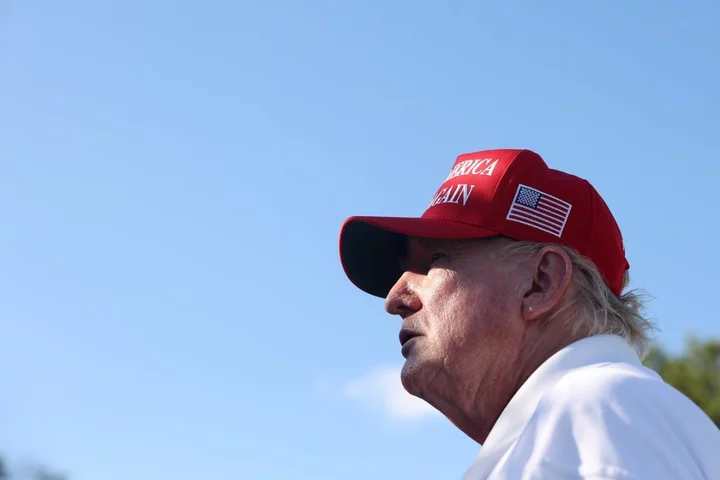
Trump blasts Jack Smith for accessing his Twitter account
Former president Donald Trump criticised Special Counsel Jack Smith for obtaining a search warrant for his old Twitter account early Monday morning. Mr Trump blasted Mr Smith’s office, which is leading investigations into the former president’s handling of classified documents and his efforts to overturn the 2020 presidential election. “How dare lowlife prosecutor, Deranged Jack Smith, break into my former Twitter account without informing me and, indeed, trying to completely hide this atrocity from me,” he posted on Truth Social. “What could he possibly find out that is not already known. Just like the early morning raid of Mar-a-Lago!” Unsealed records showed that Mr Smith’s office obtained a search warrant for Mr Trump’s account. Twitter, now known as “X,” was prohibited from informing Mr Trump. A federal court agreed with Mr Smith’s office that there were “reasonable grounds to believe” that disclosing the warrant “seriously jeopardize the ongoing investigation” by giving the former president “an opportunity to destroy evidence, change patterns of behavior, [or] notify confederates.” But X was fined $350,000 for failing to meet the deadline to produce the records in a timely manner. The three-times-indicted, twice-impeached former president said the Department of Justice should investigate President Joe Biden. “Why isn’t the DOJ raiding Crooked Joe Biden, the most CORRUPT (and Incompetent!) President in the history of the United States?” A federal grand jury indicted the former president earlier this year after a four-hour presentation from Mr Smith’s office for Mr Trump’s efforts to overturn the 2020 presidential election. Mr Trump pleaded not guilty to four charges. Mr Trump also railed against Judge Tanya Chutkan, who is presiding over the case in Washington DC, whom he said “obviously wants me behind bars.” “VERY BIASED & UNFAIR!” he said on his networking platform. Mr Trump also criticised Fani Willis, the district attorney for Fulton County, Georgia, as she prepares to potentially indict the former president for his efforts to overturn the election results in the state. “I UNDERSTAND THROUGH ILLEGAL LEAKS TO THE FAKE NEWS MEDIA THAT PHONEY FANI WILLIS, THE D.A. OF FULTON COUNTY, GEORGIA, WANTS DESPERATELY TO INDICT ME ON THE RIDICULOUS GROUNDS OF TAMPERING WITH THE 2020 PRESIDENTIAL ELECTION,” he said. “NO, I DIDN’T TAMPER WITH THE ELECTION! THOSE WHO RIGGED & STOLE THE ELECTION WERE THE ONES DOING THE TAMPERING, & THEY ARE THE SLIME THAT SHOULD BE PROSECUTED. I MADE A PERFECT PHONE CALL OF PROTEST. WHY WASN’T THIS FAKE CASE BROUGHT 2.5 YEARS AGO? ELECTION INTERFERENCE!” -Alex Woodward contributed to this report Read More Jack Smith obtained search warrant for Trump’s Twitter account, newly unveiled court documents show Trump heaps praise on anti-Muslim conspiracy theorist as fourth potential indictment looms in Georgia – latest How Fani Willis oversaw what might be the most sprawling legal case against Donald Trump Rising political threats take US into uncharted territory as 2024 election looms EXPLAINER: What are special counsels and what do they do?
2023-08-14 21:16
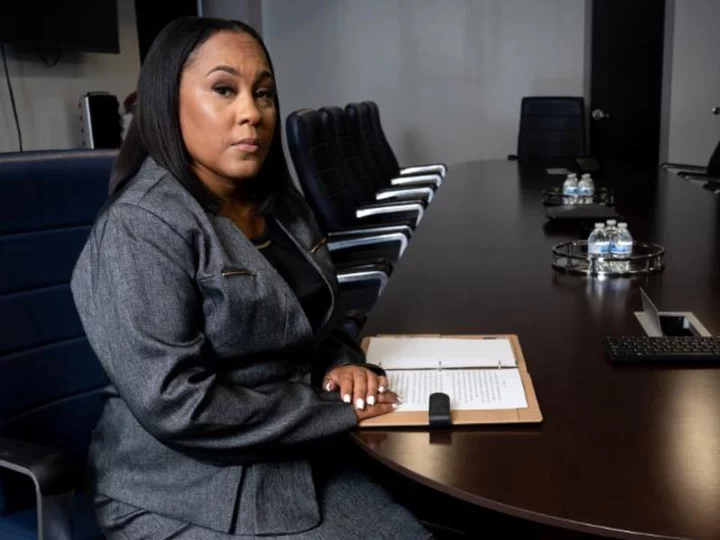
Who is Fani Willis, the Atlanta prosecutor expected to seek charges over Trump's 2020 election subversion bid?
Fulton County District Attorney Fani Willis has reemerged in the spotlight amid news that her office is expected to seek indictments regarding efforts by Donald Trump and his allies to overturn the 2020 presidential election results in Georgia.
2023-08-14 17:26
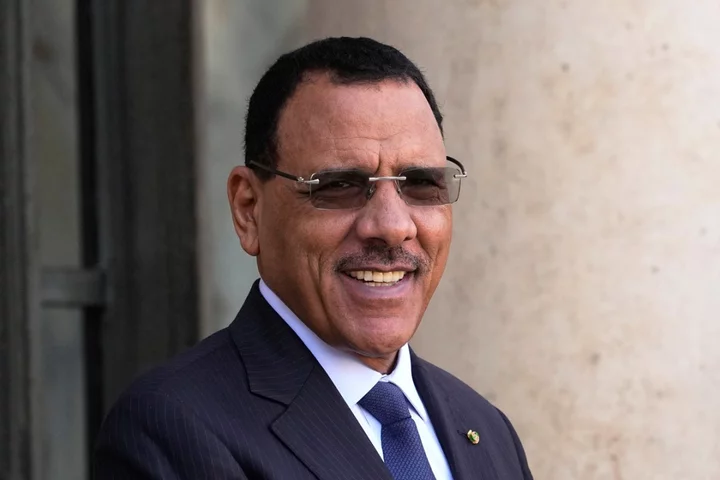
Niger’s coup leaders say they will prosecute deposed President Mohamed Bazoum for 'high treason'
Niger’s mutinous soldiers say they will prosecute deposed President Mohamed Bazoum for “high treason” and undermining state security, hours after they said they were open to dialogue with West African nations to resolve the mounting regional crisis. The announcement on state television on Sunday night, by spokesman Col. Maj. Amadou Abdramane, said the military regime had “gathered the necessary evidence to prosecute before competent national and international authorities the ousted president and his local and foreign accomplices for high treason and for undermining the internal and external security of Niger.” Bazoum, Niger’s democratically elected president, was ousted by members of his presidential guard on July 26 and has since been under house arrest with his wife and son in the presidential compound in the capital, Niamey. People close to the president as well as those in his ruling party say their electricity and water have been cut off and they’re running out of food. The junta dismissed these reports Sunday night and accused West African politicians and international partners of fueling a disinformation campaign to discredit the junta. International pressure is growing on the junta to release and reinstate Bazoum. Immediately after the coup, the West African regional bloc ECOWAS gave the regime seven days to return him to power or threatened military force, but that deadline came and went with no action from either side. Last week, ECOWAS ordered the deployment of a “standby” force, but it’s still unclear when or if it would enter the country.
2023-08-14 14:26
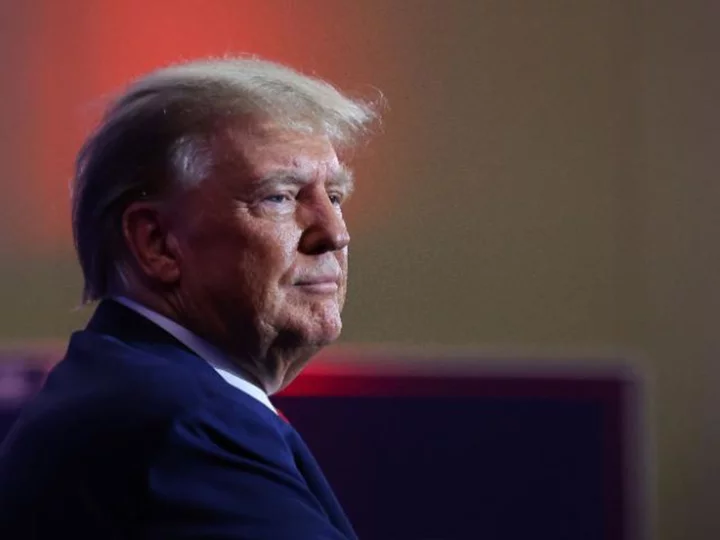
A stunning possible fourth indictment looms over Trump and the 2024 election
Yet another likely criminal indictment is looming over Donald Trump this week, which would deepen his already extreme legal quagmire and further divert an unparalleled election season from the campaign trail into multiple courtrooms.
2023-08-14 12:20
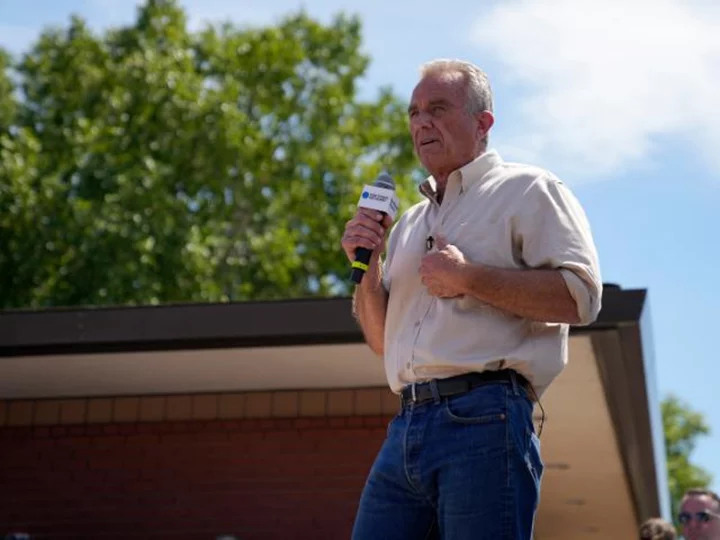
RFK Jr.'s campaign tries to walk back his support of three-month federal abortion ban
Robert F. Kennedy Jr.'s campaign on Sunday evening quickly tried to walk back comments the Democratic presidential candidate had made earlier in the day in support of a nationwide abortion restriction after the first three months of pregnancy.
2023-08-14 11:15
